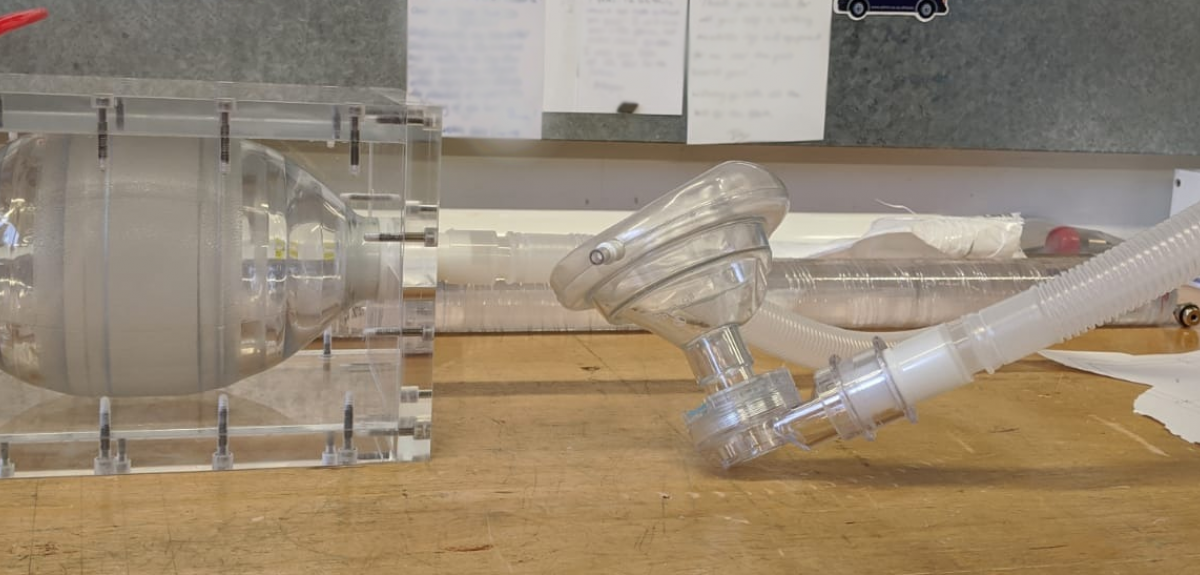
Credit: University of Oxford
Oxford and King’s developing prototype for rapidly deployable ventilator
An interdisciplinary team of engineers and medics is addressing ways to increase the UK’s capacity for ventilator manufacture.
Engineers, anaesthetists and surgeons from the University of Oxford and King’s College London are building and testing prototypes that can be manufactured using techniques and tools available in well-equipped university and small and medium enterprise (SME) workshops.
The team, led by Oxford Professors Andrew Farmery, Mark Thompson and Alfonso Castrejon-Pita and King's College London’s Dr Federico Formenti, have been working to define novel mechanisms of operation that will meet the required specifications for safe and reliable function. The design aims to exploit off-the-shelf components and equipment.
The researchers are working in response to UK government calls to increase the country’s ventilator manufacturing capacity due to COVID-19. Demonstrating safety and reliability and achieving regulatory approval of the opensource design will be necessary, and once this has been achieved, the approach could unlock potential for a new kind of distributed manufacturing effort.
Government coordination and ongoing rapid competitive selection of the best design concepts will enable universities, SMEs and large industry to make and assemble these ventilators close to their local NHS services. This may allow local scaling according to demand, and reduce stress on NHS distribution.
Professor Thompson, Oxford’s Department of Engineering Science, says: ‘This extraordinary situation demands an extraordinary response and we are pulling all the talents together in an exceptional team combining decades of experience translating research into the clinic, brilliant innovators, and highly skilled technicians.’
Professor Farmery, Oxford’s Nuffield Department of Clinical Neurosciences, says: ‘Ordinarily, to develop a medical device such as this would be a huge task, and would take years. We have designed a simple and robust ventilator which will serve the specific task of managing the very sickest patients during this crisis.
‘By pooling available expertise from inside and outside the University, and making the design freely available to local manufacturers, we are pleased to be able to respond to this challenge so quickly.’
Within a matter of weeks it is hoped a prototype could be developed which would satisfy MHRA (the Medicines and Healthcare products Regulatory Agency) requirements, and the scientists believe a mature manufacturing network at scale could be achievable within 2-3 months.
The Department of Engineering Science has committed to support prototyping efforts and the team is looking for options to develop regulatory approval. The next steps are ensuring the prototype has buy in from all stakeholders, especially healthcare staff, and to demonstrate compliance with the MHRA requirements of performance, safety and reliability.
Professor Mark Thompson says: ‘The academic partners can provide free to use plans and designs available for download; central communication with workshops at Oxford to provide advice; step-by-step videos and guides for assembly; along with videos to facilitate training and use.’
King’s College London have offered the use of their workshops to manufacture/3D print bespoke components.
Dr Formenti says: ‘Thinking beyond the current pandemic, we are also aiming to share the know-how and refinement of this relatively inexpensive approach with other countries.’
Find out more on the project website: https://oxvent.org/
 New analysis of archaeological data reveals how agriculture and governance have shaped wealth inequality
New analysis of archaeological data reveals how agriculture and governance have shaped wealth inequality
 Cambridge victorious in Women's and Men's Boat Races 2025
Cambridge victorious in Women's and Men's Boat Races 2025
 Expert Comment: Ethical and legal challenges of uterus transplants in Mexico
Expert Comment: Ethical and legal challenges of uterus transplants in Mexico